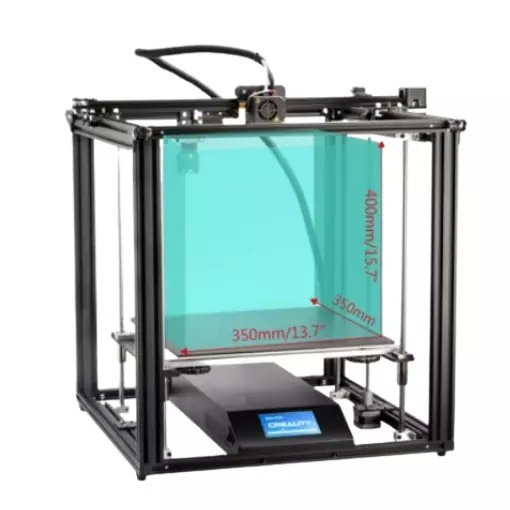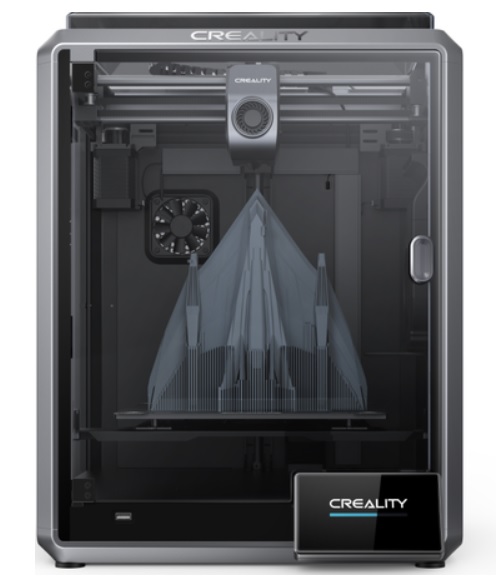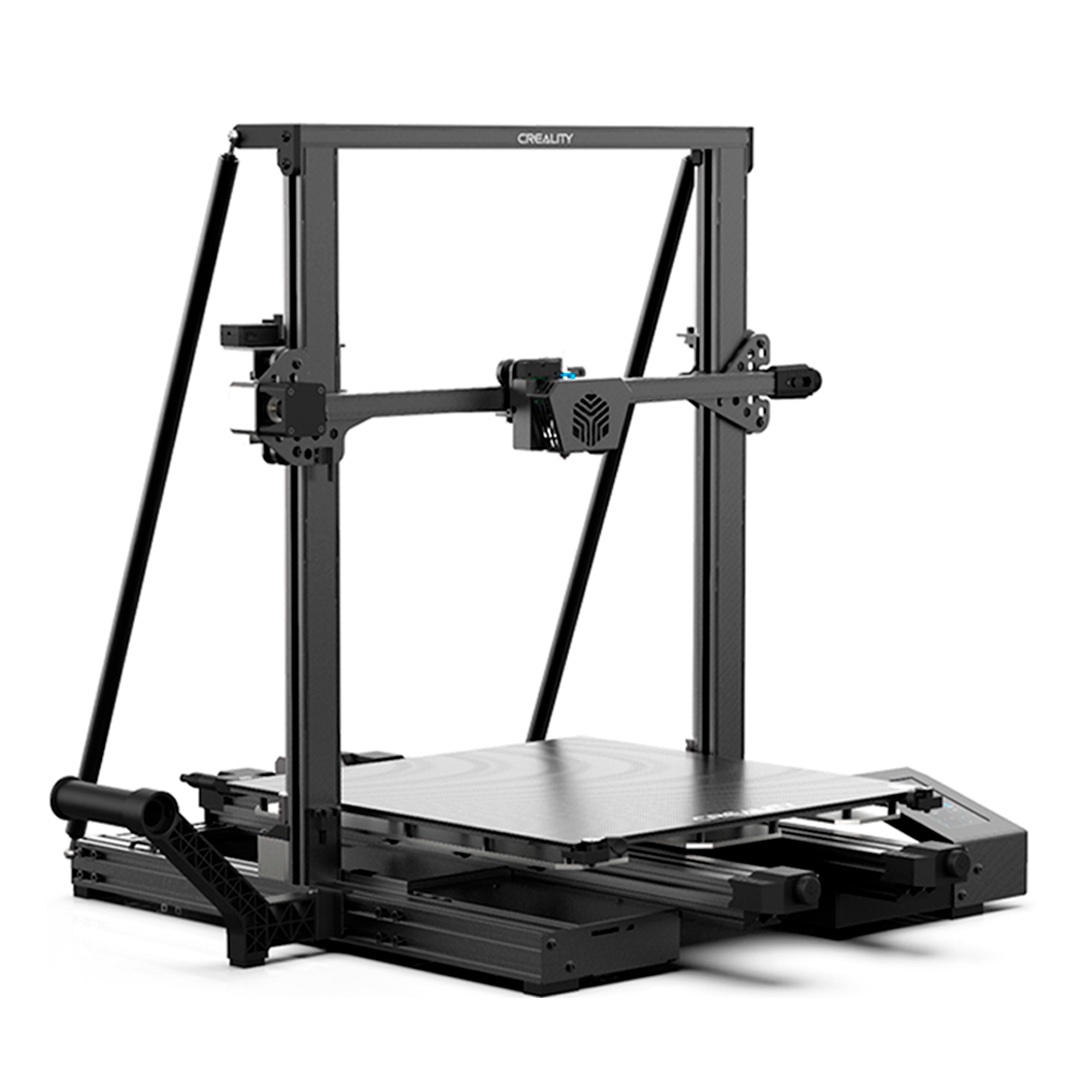Compare Ender 5 Plus vs K1 vs CR 6 Max
Comparison between the best 3D printers
Choose the best 3D printer at the best price. The cheapest 3D printers are here.
Buy a 3D printer here with 3D Fila.
 |
 |
 |
|
| Model | Ender 5 Plus[BUY Ender 5 Plus] |
K1[BUY K1] |
CR 6 Max |
| Printing Material | Filament | Filament | Filament |
| Estimated price | $599,00 | $399,00 | $700,00 |
| Fabricante | Creality 3D | Creality 3D | Creality 3D |
| Release Year | 2019 | 2023 | 2021 |
| Print Volume [mm] | 350x350x400 | 220x220x250 | 400x400x400 |
| Printer Size [mm] | 632x619x666 | 355x355x480 | 725x640x691 |
| Weight [kg] | 18,2 | 12,5 | 14 |
| Power Loss Recovery | YES | YES | YES |
| Enclosed printer | NO | YES | NO |
| Bed Leveling | Automatic | Automatic | Automatic |
| Filament End Sensor | YES | YES | YES |
| Bed type | Heated | Heated | Heated |
| Power supply system | Bowden | Direct Drive | Bowden |
| Standard nozzle | 0,4 | 0,4 | 0,4 |
| Maximum Nozzle Temperature [°C] | 260 | 300 | 260 |
| Maximum Bed Temperature [°C] | 100 | 120 | 90 |
| Maximum printing speed [mm/s] | 180 | 600 | 100 |
| Filament holder | YES | YES | YES |
| Camera for supervision | NO | NO | NO |
| Recommended filaments | PLA, TPU, ABS, PETG | ABS, PLA, PETG, PET, TPU, PA, ABS, ASA, PC, PLA-CF, PA-CF, PET-CF | PLA, PETG |
| Recommended slicers | Cura, Simplify, Slic3r | Creality Print; Cura, Simplify3D e PrusaSlicer | Cura, Simplify, Slic3r, IdeaMaker |
| Maximum Resolution [mm] | 0,1 | 0,1 | 0,1 |
| Processor | 32 bits | ||
| Display | Touchscreen TFT 4,3'' | Display touchscreen 4,3'' | Display touchscreen 4,3'' |
| Power Supply | 24V / 504W | 110/220V / 350W | 110/220V / 500W |
| Connectivity | SD / USB | Ethernet / USB / Wi-Fi | SD / USB |
| Operating systems | Windows, Mac, Linux | Windows, Mac, Linux | Windows, Mac, Linux |
| Date of registration in the system | 2021-04-14 | 2023-04-17 | 2022-11-04 |
| Release date | 2019 | 2023 | 2021 |
| Extra features | The Ender 5 Plus offers a large print volume (350x350x400 mm) and fast assembly. It includes a BLTouch sensor, but with range limitations. It stands out for its dimensional accuracy, although it requires adjustments to the slicer settings. Despite the noise, its integrated design saves space, and includes features such as a filament sensor and power resumption. Ideal for large projects, it requires refinement in the settings for high-quality prints. | The K1 is an extremely fast FDM 3D printer, reaching 600mm/s, 12 times faster than standard models. Equipped with a Core XY system and lightweight print head, it offers energy efficiency and high print quality. It stands out for its dual-gear extruder and quickly heated hotend, as well as dual cooling to prevent warping. Its robust structure ensures stability at high speed, with optimized software to speed up the printing process. | Crealitys CR-6 Max printer offers a large 400 x 400 x 400mm build area, perfect for larger projects without dividers. Its auto-leveling system and force sensor simplify setup. It has a 4.3-inch touchscreen and convenient features like a tool drawer and filament holder. Plus, its modular hotend, redesigned extruder, and silicon carbide-coated build plate improve print quality. |
| Support for multiple colors and materials (AMS and CFS) | NO | NO | NO |
Notes * |
|||
| Cost-benefit | 6 / 10 | 8 / 10 | 6 / 10 |
| Hardware | 2 / 10 | 4.8 / 10 | 2.4 / 10 |
| Screen | . | . | . |
| Print volume | 4 / 10 | 3 / 10 | 4 / 10 |
| Performance | 1 / 10 | 5 / 10 | 1 / 10 |
| [BUY Ender 5 Plus] | [BUY K1] |
Conclusion |
| In comparing the three 3D printers—Ender 5 Plus, K1, and CR-6 Max—several key factors emerge that can guide prospective buyers toward making an informed decision. The **K1** stands out due to its excellent performance, boasting extremely high printing speeds and a simplified setup with automatic bed leveling. Its lightweight design and efficient dual-gear extruder contribute to both energy efficiency and high print quality, making it a prime choice for those seeking rapid production without sacrificing quality. Moreover, at a mid-range price point, the K1 offers a compelling balance of features and affordability, justifying its top cost-benefit score. On the other hand, the **Ender 5 Plus** and **CR-6 Max** cater more to users looking for larger build volumes for substantial projects. While the Ender 5 Plus provides a decent print size and good dimensional accuracy, it requires some adjustments for optimal results, potentially making it less accessible for beginners. Its overall value is further impacted by a lower performance score and higher price compared to the K1. The **CR-6 Max**, despite offering a large build area and several user-friendly features such as a touchscreen and a modular hotend, falls short on speed and print performance, costing more without significantly enhancing user experience or print quality compared to the K1. Its higher price spotlights a cost-benefit ratio that does not match the flexibility and rapid output of the K1. In conclusion, for users prioritizing speed and performance at a reasonable price, the **K1** emerges as the best option. Those needing larger print volumes might consider the Ender 5 Plus or CR-6 Max, but should be prepared to compromise on speed and cost-effectiveness. Overall, the decision should hinge on individual printing needs, budget, and experience level. |

